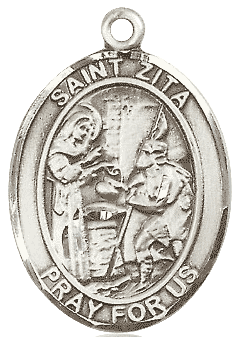Saints
St. Zita Medal – Patron Saint of Household Chores
“Now therefore you are no more strangers and foreigners, but you are fellow-citizens with the saints and domestics of God.” (Ephesians, Ch. 2, v. 19.)
If the average person of today should ever find herself bemoaning the fact that you do not resemble the accepted synthetic picture of of success that you often find on TV and advertisements, but must perform an ordinary and supposedly unglamorous job of running a home, then you can look for encouragement to a woman who attained heavenly publicity by performing that same task,-St. Zita of Lucca, Italy.
Biography of St. Zita
 St. Zita is a Catholic saint from the 13th century, who is the patron saint of domestic servants, housekeepers, and cooks. She is known for her kindness, her hardworking nature, and her devotion to God.
St. Zita is a Catholic saint from the 13th century, who is the patron saint of domestic servants, housekeepers, and cooks. She is known for her kindness, her hardworking nature, and her devotion to God.
Zita was born in the town of Lucca, in Tuscany, Italy, in 1218. From a young age, she was known for her kindness and her love of serving others. At 12 years old, she became a domestic servant to a wealthy merchant family. She was known for her hardworking nature, her devotion to God, and her kindness to those around her.
Zita was said to have performed many miracles during her lifetime, and was known for her ability to find lost objects. She was also known for her humility and her charity towards the poor. She was particularly devoted to the poor and would often give away her own food and clothes to them.
Despite her simple and unassuming nature, Zita’s reputation for holiness spread rapidly, and she became a well-known figure in her community. After her death in 1272, many miracles were attributed to her intercession and her cult quickly spread.
She was canonized by Pope Callixtus II in 1597 and her feast day is celebrated on April 27th. In the centuries that followed, her cult spread throughout Europe, and many churches and institutions were dedicated to her.
St. Zita is considered the patron saint of domestic servants, housekeepers, and cooks. Her image is often depicted holding a basket of keys, symbolizing her role as a housekeeper, and also holding a broom or a bag of bread, symbols of her hardworking nature and devotion to God. Her name is often invoked by those who are looking for a job, particularly in the domestic field, as well as by cooks and housekeepers who are seeking to improve their skills.
She is also considered a model of Christian charity, particularly for those in the service of others, and her life is considered an example of how to serve God in one’s daily life through small acts of kindness and devotion. Her popularity is particularly in Tuscany, Italy and in the Italian speaking countries
St. Zita’s remains are preserved in the Basilica of San Frediano, in Lucca, Italy, where she is venerated as a local saint. Her cult continues to be strong in the area and her feast day is widely celebrated in Lucca and other parts of Tuscany.
The Life of St. Zita
 Not too much is known about the life of St. Zita, but this is not surprising since her life was quiet, relatively uneventful, and without fanfare. What we do know, however, shows her to be completely humble and selfless, a diligent woman dedicated to God and one who consecrated to Him her every act and each day of her life.
Not too much is known about the life of St. Zita, but this is not surprising since her life was quiet, relatively uneventful, and without fanfare. What we do know, however, shows her to be completely humble and selfless, a diligent woman dedicated to God and one who consecrated to Him her every act and each day of her life.
St. Zita was born at the beginning of the thirteenth century, about 1218, as far as one can determine, at Montesgradi, near Lucca in Italy. Her childhood was very ordinary, and as a young child, her sweetness and modesty fascinated everyone with whom she came in contact. Her parents had a small lot of land on which they grew vegetables, which Zita, at the very early age of twelve used to sell in the town, never years, failing to find customers who admired her pleasant and attractive personality.
She was reared with the greatest and love of God, by a poor but very virtuous mother who bequeathed her holiness to her daughter. At eighteen years of age she was sent to work for a family of Lucca, the family of a wealthy citizen by the name of Fatinelli, who had been one of her customers. Their home was next door to the Church of St. Frigidian.
From the very outset, being a very religious and obedient girl, Zita considered her work as something almost decreed by Almighty God as part of her penance in life, a penance, however, which she joyfully performed. She considered her master and her mistress as having been placed over her by God, and she obeyed them strictly in all matters and questions of household discipline.
St. Zita Patron Saint of Cleaning
 In spite of her scrupulous attendance to house hold duties, she managed to acquire a wonderful facility of joining with them almost continual mental prayer, and she kept her soul constantly attentive to the Divine Presence. The young domestic fasted a great deal and she saved most of the food allotted to her, in order that she might give it to the hungry poor.
In spite of her scrupulous attendance to house hold duties, she managed to acquire a wonderful facility of joining with them almost continual mental prayer, and she kept her soul constantly attentive to the Divine Presence. The young domestic fasted a great deal and she saved most of the food allotted to her, in order that she might give it to the hungry poor.
It was also her custom, we are told, to give her bed very often to homeless women, and many nights Zita could be found sleeping feet on the floor of her room. Like so many unknown and unpublicized saints of our day, at their St. Zita had a burning devotion to daily Mass. It was her practice to arise several hours before the rest of the family and the other servants, which time she would devote to prayer and regular at tendance at morning Mass in the near-by parish church of St. Frigidian.
For several years, however, in spite of her modesty and devout behavior, one can gather from the chronicle of her life that Zita suffered the harshest trials at the hands of her fellow-workers, which is often the case with truly religious people. They regarded her as something of a pious fraud. As some lukewarm Catholics, who are jealous of another good Catholic, might phrase it, they thought she was a “pillar of the church” as she actually did become later in a good sense through the process of canonization,-a true saintly pillar of the Church of Christ.
Her modesty in word and behavior was classified as foolishness by some of the frivolous servants, and thought to be a snobbish lack of vivaciousness. They looked upon her diligence at work as an affectation, or the manifestation of a secret pride. Even her mistress was very much against Zita, and her master, Fatinelli, would fly into a rage whenever the young girl would appear within his sight.
In those days, we should bear in mind, there were no labor unions or employment agencies, to which an irate domestic servant could resort the assurance of fair treatment. It was a society where the wealthy were imperious and powerful and the poor had to be satisfied with the frequent abuse that accompanied menial employment.
To her great credit Zita continued amidst this atmosphere of dislike and persecution from employer and co-worker alike, and she never once lost her patience. Eventually, however, as truth will out, God always using the weak to confound the strong, the girl’s meekness and devotion to duty overcame the antipathy of her employers and the jealousy of her fellow-workers.
St. Zita offered up her house chores as prayers to God
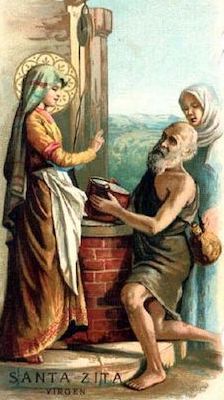 At long last the Fratellis discovered the treasure which their family possessed in the fidelity and example of this humble saint. Fortunately this recognition did not turn her head, as it might in the case of some young girls in similar circumstances, but she continued to act in the same manner in which she had behaved before their change of heart.
At long last the Fratellis discovered the treasure which their family possessed in the fidelity and example of this humble saint. Fortunately this recognition did not turn her head, as it might in the case of some young girls in similar circumstances, but she continued to act in the same manner in which she had behaved before their change of heart.
After a short time, Zita was made housekeeper and in this new position she remained keenly aware of the fact that her employers committed to her care the government of their family and the manage ment of all their affairs. She was meticulously careful in matters of economy, remembering always that she had to render an account to Almighty God.
The writers of her life tell us that whenever her daily routine would allow her a little leisure, Zita would spend most of this time in contemplation and prayer in her tiny room. Although she was in somewhat a position of authority over them, she respected her fellow-servants and never lorded it over them on any occasion. She never left to others any unsavory task which she, herself, was still capable of performing.
It is related that on one or two occasions, she was sent on an errand by her employers when the weather was extremely stormy. She executed such missions punctually, sometimes returning half-drowned, but always without showing any signs of reluctance or murmuring.
The “Coffee-Break Brigade” of today’s work a-day world could certainly take a page out of the book of her life! Some of our younger workers, in particular, who are always looking for the Christmas bonus, but who think nothing of wilfully wasting their employer’s time, and grumble if they are asked to spend five minutes after work on some important project for an employer who treats them well, can thoughtfully meditate on this aspect of St. Zita’s life.
The Miracles of St. Zita
 St. Zita, it is said, gradually came to exercise great influence over her master and could silence his rages, which were very frequent, with one word. The Fatinellis came to realize that Zita was very close to God, and they said: “We must not bind her hands.” They permitted her to dispense the bounty of the mansion at Lucca to the sick and the poor of the area. Zita, however, always used this money judiciously and with their authorization.
St. Zita, it is said, gradually came to exercise great influence over her master and could silence his rages, which were very frequent, with one word. The Fatinellis came to realize that Zita was very close to God, and they said: “We must not bind her hands.” They permitted her to dispense the bounty of the mansion at Lucca to the sick and the poor of the area. Zita, however, always used this money judiciously and with their authorization.
About this time a series of amazing events began to happen in the life of this Saint of the Kitchen. A gate leading to a bridge, closed and pad locked, opened of itself as Zita approached it! A jar of water which she had drawn in the courtyard to give a poor wayfarer was found to contain the sweetest winel A cloak which her employer had loaned her was given by Zita to a shivering whom she met on Christmas eve, and it was returned turned, as promised, by a person whose face shone with a heavenly light, and given to Zita in the presence of the Fatinellis. All these events and other marks of God’s love of Zita were faithfully recorded by the Fatinellis, and preserved for the future, when the Church would one day pronounce them to be miracles.
St. Zita used her position to give to others
St. Zita possessed and practiced the virtue of charity in a magnificent degree. I she ever heard any member of the household or the community slandered or criticized, she always took their part and defended them.
In her last illness, Zita clearly foretold the time of her death, which finally came to pass in 1278, at the age of sixty years, after more than forty years of faithful service with the family to whom she had dedicated her life. At least 150 miracles have been proved through ecclesiastical investigation for those who have had recourse to this humble saint. She can indeed be called the patroness of domestic servants, the working girl, and those self-sacrificing women who have devoted their lives to running the household and managing the affairs of others, perhaps even rearing the children of sick and less fortunate relatives.
The Kitchen Prayer by Brother Lawerence
A great many spiritual lessons can be learned from the life of this thirteenth century saint, and perhaps after reading her life some of these might already be apparent. Some of these lessons might be: respect for employers, set a good example to fellow workers; maintain a fair economy in the home; trying to balance a budget; and being a good homemaker.
Many are familiar with the popular “Kitchen Prayer”,
” O Lord of pots and pans and things,
Since I have no time to be
a great saint by doing lovely things,
or watching late with Thee,
or dreaming in the dawnlight,
or storming Heaven’s gates,
Make me a saint by getting meals,
and washing up the plates.Warm all the kitchen with Thy Love,
and light it with Thy peace;
Forgive me all my worrying,
and make my grumbling cease.
Thou who didst love to give men food
in room, or by the sea,
Accept the service that I do-
I do it unto Thee.”
A prayer which could have been inspired by the life of St. Zita, but her influence went beyond pots and pans, as the influence of every Catholic homemaker must proceed. This is only part of the household drudgery, and indeed the term, “household drudgery” is a misnomer today for the work that daily confronts the modern husband and wife.
Today, we all agree, is far removed from the day of our mothers and grandmothers, and certainly very far removed from the days when St. Zita had to supervise a large house hold. Every conceivable gadget and labor-saving device is available to make things easier, and to help maintain a good temperament on the part of any person who must supervise and care for a home, whether it be her own or the home of her employer.
Even if one cannot afford the full array of these technological wonders, nevertheless the advent of frozen foods and dehydrated delicacies make housework, homemaking and meal-making a relatively rapid and smooth process for the average couple.
Pope Pius XII, in 1953, while addressing a group of women said: “Mothers must acquire the elementary knowledge necessary for the government of a family, the art of keeping a house in order, of dealing with statements of accounting, (and) useful ideas about bringing up children.” He went on to censure women who are constantly absent from their homes with frivolous tasks and futile amusements and he said: “To such painful consequence of the absence of the mother from the home, there is added another, still more deplorable. It concerns the education, especially of the young girl, and her preparation for real life. Accustomed as she is to see her mother always out of the house, and the house itself so gloomy in its abandonment, she will be unable to find any attraction for it, she will not feel the slightest inclination for austere housekeeping jobs. She cannot be expected to appreciate their nobility and beauty, or to wish one day to give herself to them as a wife and a mother.“
The wisdom and insight of this beloved pontiff’s words cannot be over-emphasized, especially in our time, when we so frequently encounter some blushing bride or bashful groom who cannot keep a clean and orderly house or prepare a halfway decent meal. Untidiness has certainly often contributed to the breakup of what otherwise might have been a happy marriage. In this field the modern homemaker, married or single, should always keep in mind, as the saints did, that “Cleanliness is next to Godliness.” Our bodies are called the temples of the Holy Ghost, and by the Fifth Commandment we are required to see that proper nourishment and clean living conditions are realized in a manner that is conducive to good health.
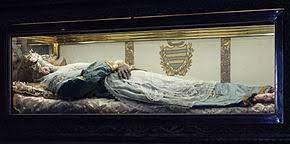
St. Zita Remains a model to homemakers today
St. Zita can be a model, too, of women who must live under the same roof with other members of the same sex, whether it be a blood relative or an in-law, especially when it comes to sharing work in the home. There is an old saying that “you can’t put two women in one kitchen, any more than put two shoes on one foot“.
How often does it happen when financial problems, sickness, or old age you can makes it necessary for in-laws or relatives to live together, that arguments so frequently arise about how this or that should be done, or who will do this or that particular chore, or what expenses are to be paid and by whom? We witness the flare-up of tempers, long periods of silence and not talking to one another, with bad example all this time to children who should be shown what happiness is in a home and how to run a household with Christlike patience and prudence.
If each and every morning people in these difficult situations we were to make a morning offering and dedicate their day’s work to Almighty God, as St. Zita did, we wonder if such an irritating and uncharitable state of affairs would exist! St. Zita in many ways was like St. Therese of Lisieux, for she was another saint of the “little way”. Her day-in day-out existence of doing household tasks and managing the affairs of her employers can well be emulated by the average Catholic housewife or homemaker of today in every aspect, and her program of dependability can certainly be followed by woman employed in any field where she must render service to others.
St. Zita patron saint of chores
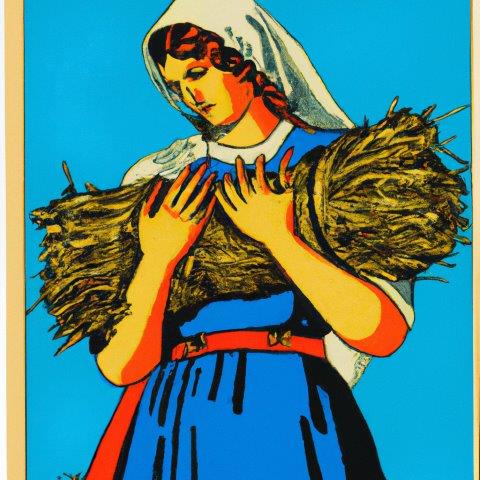 To become a saint as St. Zita did, it is not necessary to change one’s daily routine, as monotonous as that routine might seem,-making beds, washing dishes,-preparing three meals, and count less other tasks, such as washing clothes and making the daily pilgrimage to the supermarket. It is not necessary to remain apart at all times, to retire into a desert, to do anything startling and extraordinary. All that is required is to overcome the little faults of daily life, and to consecrate one’s daily actions to God, whether those actions are housework, banging a keyboard, working in a hospital, sitting behind a teacher’s desk, or selling shoes in a department store. It means simply raising our minds and hearts to God, which is only another way of saying a prayer.
To become a saint as St. Zita did, it is not necessary to change one’s daily routine, as monotonous as that routine might seem,-making beds, washing dishes,-preparing three meals, and count less other tasks, such as washing clothes and making the daily pilgrimage to the supermarket. It is not necessary to remain apart at all times, to retire into a desert, to do anything startling and extraordinary. All that is required is to overcome the little faults of daily life, and to consecrate one’s daily actions to God, whether those actions are housework, banging a keyboard, working in a hospital, sitting behind a teacher’s desk, or selling shoes in a department store. It means simply raising our minds and hearts to God, which is only another way of saying a prayer.
In the words meaningful verse: “Going our daily way then we are praying, If God is in our hearts and welcomed there. Nothing in His name is ever lowly. Mopping up a floor may be a prayer!” The maid of Lucca, whose life we have considered, is the advisor of every Catholic woman, wife, mother, or bachelor girl, in the great virtue of domestic charity.
Our Divine Lord, we know from Sacred Scriptures, frequently visited the home of Martha, Mary and Lazarus at Bethany, and we also read that Mary sat at the feet of Christ, while Martha was “busy about many things”, doubtless performing the household chores and preparing meals for her Divine Guest. Mary represented the woman in the contemplative religious life, and Martha was given to us as the example of the occupied woman in the home and industry.
Our Divine Lord respected and loved them both, and He favored Martha, the homemaker by revealing directly to her the great promise of eternal life when He brought Lazarus forth from the tomb. Just as Our Divine Lord held Martha of Bethany in such high esteem, and proved that He favored the saintly domestic and housekeeper of Lucca in the thir eenth century, so, too, does He look with affection upon those of today who fill this same role, in their own home or the home of another person. The home that is not “Christocentric”, is not a home but only a house.
The Catholic home today
In 1923, when Herbert Hoover was president of “Better Homes in America”, that organization offered a prize for the best definition of a “better home”, to be written by a school child. The award was won by a Tennessee mountain lad, who wrote: “A better home is a place my dad is proud to support, my mother likes to take care of, and we like to be in. It is a place to grow old in.“
For the most part the pattern for a better home in the Christlike manner is set by the mother of the family, and that is why many have been given the title of “Homemaker”. As the little mountain boy said: “A better home is a place… my mother likes to take care of …” The life of St. Zita in this respect is indeed a guidebook for that army of women who classify themselves on census lists as “Homemakers”, a title, unfortunately which many of them never approach in the real sense of the word, in balancing a budget, cleaning a house, or cooking a meal!
The contemporary Catholic, who wants to be a real “Homemaker”, in the way that Christ wants us to be, will have to imitate this Italian saint of the thirteenth century, not only in her many daily occupations, and striving to please others, but primarily in her desire to please God. If she is a single working girl, whatever her occupation might be, then for her St. Zita is the teacher of good common sense, and a Catholic awareness founded in humility, an awareness of the need of those with whom she works and with whom she is daily associated.
Like St. Zita who truly became a “domestic of God”, in the words of St. Paul, the modern Catholic woman, in the most honorable task of womanhood, can only make the house in which she lives a home, if each and every day she offers all her work to God, and follows the great rule of St Zita’s spirituality: “Do what pleases God, and avoid what displeases Him,” a simple and uncomplicated way of life. As our Pope John XXIII, phrased it so recently in his all-embracing “Mater et Magistra”: “… It is perfectly in keeping with the plan of Divine Providence that each one develop and perfect himself through his daily work, which for almost all human beings is of a temporal nature.”
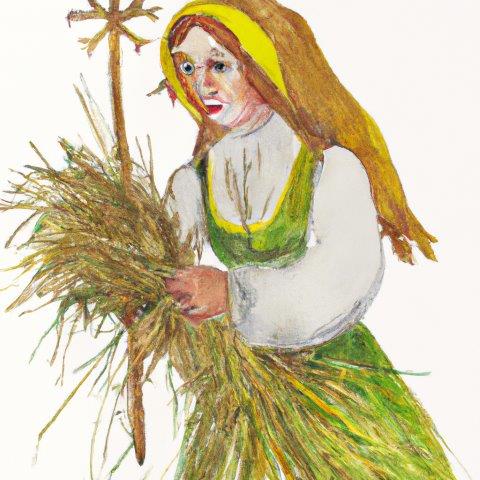 It is significant to, that on April 26, 1959, His Holiness, Pope John XXIII, in the first beatification of his pontificate, enrolled among the Blessed, Venerable Elena Guerra, Foundress of the Order of St. Zita, Oblates of the Holy Spirit, a teacher and prolific writer, who died at the age of eighty years. As a child Elena Guerra had very often knelt at the tomb of St. Zita, in the church of St. Frigidian at Lucca. Through her beatification, the Holy Father has called renewed attention in our time to this humble servant maid who helped form the foundress in her sanctity. What greater surety do we need that St. Zita will help fashion the same holiness in the soul of every woman who imitates her way of life?
It is significant to, that on April 26, 1959, His Holiness, Pope John XXIII, in the first beatification of his pontificate, enrolled among the Blessed, Venerable Elena Guerra, Foundress of the Order of St. Zita, Oblates of the Holy Spirit, a teacher and prolific writer, who died at the age of eighty years. As a child Elena Guerra had very often knelt at the tomb of St. Zita, in the church of St. Frigidian at Lucca. Through her beatification, the Holy Father has called renewed attention in our time to this humble servant maid who helped form the foundress in her sanctity. What greater surety do we need that St. Zita will help fashion the same holiness in the soul of every woman who imitates her way of life?
As an appropriate conclusion to this saint’s life and influence in the lives of others, the words of Richard Cardinal Cushing might be cited -words of advice and encouragement to the women of today who feel themselves forgotten and confined by the walls of a home, -homemakers who feel their duties boring and unglamorous: “Performed with cheerfulness and alacrity, as Zita performed them, the everyday duties of the home become hal owes and pleasing to God. Humdrum they may appear at times, but they are an integral and important part of family life, binding the members together in unity and peace. Surely there would be fewer broken homes, and fewer separations between those whom God has joined together if this truth were realized.”
Popular St. Zita Medal and St. Zita Rosary
Popular St. Zita Items
A St. Zita medal or a St. Zita rosary is a perfect gift to give to a young woman who has chosen Saint Zita as their confirmation name. As the patron saint of chores and housekeeping, wearing a St. Zita medal daily is a perpetual prayer for Saint Zita to intercede on behalf of the wearer. As saints are united closer to God, their prayers are more efficacious, and enriches your own prayer.
Additionally, a Saint Zita pendant is a reminder to emulate the example of the holy saint as you care for your family, complete your daily chores, or work to clean your church, community, or job site. What a beautiful testament of faith to share with the world, or to keep discretely tucked under your clothes. During the challenging moments of your day, reflect upon the holy life of St. Zita and pray for their intercession and protection.
Our hand pressed Saint Zita medal pendant features a beautiful image of St. Zita sharing the Good News, surrounded by the words “St. Zita Pray for Us”
By Type
Patron Saints - Z's
PRAYERS TO ST. ZITA
Prayer as you put on a St. Zita Medal Necklace
O Divine Master, you taught your faithful servant, Blessed Zita, through prayer and perseverance that no labor in your name is ever lowly. In like manner help us in all our daily tasks to do what pleases you and ever avoid what displeases you, that we may become fellow citizens with the saints and domestics of God: Who lives and reigns, world without end. Amen.
Prayer of Intercession to St. Zita
Glorious St Zita, Example of Christian virtues, intercede for me in this my necessity (name it). Obtain for me also diligence in all my duties and patience in all my trials, so that, following your example and being helped by your intercession in the miseries of this life, I may be united to you in the life to come, where there shall be no more weeping and sorrow, but joy and gladness and everlasting happiness. Amen.
Prayer to Saint Zita
St. Zita,
inspire us to take pride in our daily work
and do it to the best of our abilities
out of Love for God.
May we find Jesus in the most menial of tasks.
May we always embrace a spirit of obedience
and charity as you did.Pray for us St. Zita
that we may have a generous heart
that gives even when we have little.
Place a trust in Jesus deep in our heart
that we may never experience despair or loss of hope.
Please carry the petitions we hold in our heart
to Jesus on our behalf.
Prayer to St. Zita
O St. Zita, faithful servant of God,
you lived a life of humility and charity,
devoting yourself to the service of others.
Inspire in us a love for all people,
especially those in need,
and a willingness to serve them with joy.
Through your intercession,
may we grow in holiness and love,
and one day share in the eternal happiness of heaven.
Amen.
Another Prayer to St. Zita
Dear St. Zita, patron saint of domestic workers,
teach us to perform our daily tasks with diligence,
and to find joy and meaning in even the simplest work.
May we always carry out our duties with a loving heart,
and may our work bring glory to God and serve our neighbors.
In moments of frustration and weariness,
grant us the patience and strength to persevere,
just as you did throughout your life.
Amen.
St. Zita: Patron Saint of Housekeepers and Domestic Workers
St. Zita, also known as St. Sitha, is the patron saint of housekeepers and domestic workers. She lived in the 13th century in Italy and is known for her dedication to her work and her Christian piety.
St. Zita worked as a servant in the home of a wealthy Florentine family and is remembered for her exceptional service, her kindness, and her unwavering faith. Despite her long hours and the many tasks she was responsible for, she always found time to attend Mass and to pray. Her devotion to God and her work were so great that she was said to have performed miracles, including the ability to levitate and to be in two places at once.
St. Zita is venerated by those who work in domestic and household jobs, including housekeepers, cooks, and cleaners, as a symbol of the dignity of their work and as a source of inspiration and guidance. Her example of faith, humility, and hard work encourages these workers to persevere in their tasks and to do so with joy and grace.
In conclusion, St. Zita is revered by those who work in domestic and household jobs as the patron saint of housekeepers and domestic workers. She is remembered for her exceptional service, her kindness, and her unwavering faith, and serves as a source of inspiration and guidance for those who follow in her footsteps.” “
Reflection on the feast day of St. Zita
The feast day of St. Zita is celebrated on April 27th in the Catholic Church.
St. Zita was an Italian saint who lived in the 13th and 14th centuries. She was a servant in the Fatinelli family in Lucca, Italy. She is known for her kindness and charity, and for her devotion to God, despite the difficulties of her daily life. She is the patron saint of servants and housekeepers, and is remembered for her hard work, her generosity and her deep faith.
On the feast day of St. Zita, we are reminded of the importance of humility and service in our lives. St. Zita, as a servant, had to live a hard life of work and little recognition, but she did so with a sense of purpose, devotion and generosity. She is an example of how a simple life of service, lived with faith and humility, can be a source of grace and sanctification.
St. Zita reminds us that we are all called to serve others, whether in our families, our communities or in the Church. She is a model for us of how to live a life of service with love, kindness and generosity. This can be especially challenging when we are dealing with difficult situations or people, but she is a model of how to overcome those challenges with grace, courage and faith.
St. Zita’s devotion to God is also an important aspect of her legacy. Despite the difficulties of her daily life, she found time to pray and to contemplate God’s presence in her life. She is a reminder that we should make time for God in our own lives, and to cultivate a deep and personal relationship with Him.
In conclusion, let us be inspired by the example of St. Zita, a saint of humility, service, and devotion. May her intercession guide us to be the true servants of God, through humble service, kindness, generosity, and devotion to God. May we follow her example and be the servants of love, grace, and faith in our families, communities and in the Church.
Discover biographies, prayers, and reflections for more than 400 Catholic Saints“
Saints Similar to St. Zita
You may also be interested in reading the Biography of St. Francis of Assisi and the Biography of St. Clare of Assisi. St. Zita, St. Francis of Assisi, and St. Clare of Assisi were all Italian saints associated with the Franciscan religious order and shared a devotion to a simple and humble way of life. Next up: Biography of St. Zoe of Rome
Also check out our handmade St. Zita Medal and St. Zita Rosary and St. Zita Rosary Bracelet .

